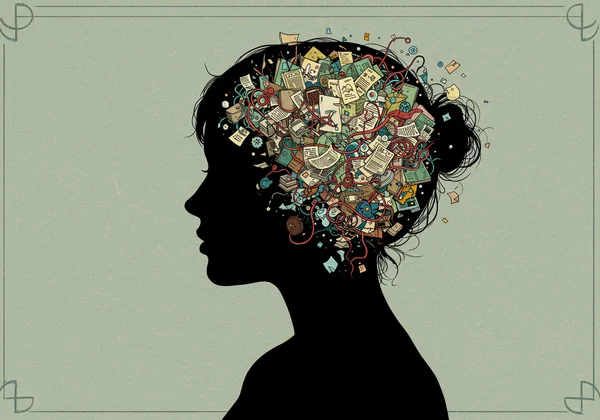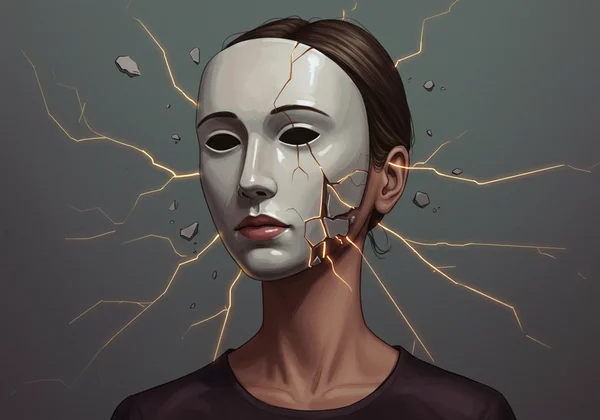ADHD in Women: Recognizing Hidden Symptoms and Considering an Assessment
October 8, 2025 | By Genevieve Hale
Have you ever felt like you're constantly running on a treadmill, trying to keep up while everyone else seems to be strolling through a park? You might feel overwhelmed by a chaotic inner world, struggle with emotional sensitivity, and berate yourself for not being more organized, all while presenting a calm, capable exterior. If this sounds familiar, you're not alone. This is the often-unseen reality of ADHD in women. Have you ever wondered if there's a reason for your constant internal struggle? For decades, the classic image of ADHD has been a young boy who can't sit still, but this narrow view has left countless women feeling misunderstood, misdiagnosed, or completely overlooked. Understanding how ADHD uniquely manifests in women is the first crucial step toward clarity and self-compassion. An online ADHD screening can be an empowering starting point on this journey.

How Female ADHD Symptoms Present Uniquely
The stereotypical image of hyperactivity is one of the main reasons ADHD is missed in girls and women. While some women do experience physical restlessness, their symptoms are often more internalized, creating a constant state of mental turmoil that isn't visible to the outside world. This internal experience is just as valid and often more exhausting.
Beyond Hyperactivity: The Subtle Inner World of Inattentive ADHD
For many women, ADHD isn't about bouncing off the walls; it's about getting lost in them. The inattentive subtype is far more common in females and presents as a quiet struggle. This can look like:
-
Persistent Daydreaming: Being called "spacey" or "a dreamer" your whole life. You might find your mind wandering during conversations or important meetings, not out of boredom, but because it’s difficult to rein in your thoughts.
-
Difficulty with Focus: Struggling to complete tasks that require sustained mental effort, especially if they are uninteresting. You might start a project with enthusiasm but lose steam halfway through, leaving a trail of unfinished work.
-
Chronic Disorganization: Your purse, desk, or car might be a source of constant frustration. It’s not about being messy; it's about your brain struggling with executive functions—the mental skills needed for organization, planning, and time management.
-
Forgetfulness: Frequently misplacing keys, forgetting appointments, or struggling to recall important details, which can lead to feelings of shame and inadequacy.

Emotional Dysregulation & Internalized Struggles: More Than Just "Moodiness"
One of the most profound yet misunderstood aspects of ADHD in women is the intense emotional experience. If you’ve been told you’re "too sensitive" or "overly emotional," it might be related to emotional dysregulation. This isn't a character flaw; it's a neurological reality. Women with ADHD often experience:
- Rejection Sensitive Dysphoria (RSD): An extreme emotional sensitivity to perceived criticism, rejection, or failure. A minor negative comment can feel like a devastating blow, leading to intense sadness or anger.
- Intense Mood Swings: Emotions can shift rapidly and intensely, often in response to small triggers. This can be confusing and draining, for both you and those around you.
- Internalized Criticism: A harsh inner critic that replays mistakes and amplifies feelings of failure. This can lead to low self-esteem and a pervasive sense of not being good enough.
The Art of Masking: Why Women Hide Their ADHD Traits
From a young age, girls are often socialized to be compliant, organized, and agreeable. This pressure leads many women to develop sophisticated coping mechanisms to hide their struggles, a phenomenon known as masking ADHD. Masking involves immense effort to appear "normal" by suppressing ADHD traits. This can involve:
- Working twice as hard as peers to meet deadlines and stay organized.
- Mimicking the social behaviors of others to fit in.
- Avoiding situations that might expose their difficulties.
- Developing perfectionistic tendencies to overcompensate for feelings of inadequacy.
While masking can help women succeed academically or professionally, it comes at a tremendous cost, often leading to burnout, anxiety, and a feeling of being an imposter.

Why ADHD is Often Overlooked or Misdiagnosed in Adult Women
The path to an ADHD diagnosis for women is often long and complicated, filled with detours and dead ends. There are systemic and biological reasons why so many undiagnosed adhd women struggle for years without answers. Recognizing these hurdles is key to advocating for yourself and seeking the right kind of support. If you suspect your struggles go deeper, our ADHD self assessment can offer initial insights.
The Overlap: When ADHD Looks Like Anxiety or Depression
The internal chaos, constant worry, and feelings of failure associated with untreated ADHD can easily be mistaken for other mental health conditions. It's incredibly common for women to be diagnosed with anxiety or depression first, as their internalized symptoms fit those profiles. While these conditions can co-exist with ADHD, medication or therapy for anxiety alone may not address the root executive function challenges, leaving women feeling like they are "failing at therapy."
Gender Bias in Diagnostic Criteria and Research
Historically, ADHD research has overwhelmingly focused on hyperactive young boys. The diagnostic criteria in manuals like the DSM-5 were developed based on these male-centric models. As a result, healthcare professionals who are not specifically trained in how ADHD presents in females may not recognize the quieter, inattentive, and emotionally intense symptoms common in women. This gender bias means women's experiences are often invalidated or dismissed.
Hormonal Fluctuations: Impact on ADHD Symptoms in Women
Hormones like estrogen play a significant role in regulating neurotransmitters, such as dopamine, which are central to ADHD. Consequently, many women notice their ADHD symptoms change in intensity throughout their menstrual cycle. Symptoms can worsen during periods of low estrogen, such as before menstruation or during perimenopause and menopause. This connection is often overlooked in a standard assessment, but it’s a critical piece of the puzzle for understanding adult adhd women.
Your Path to Clarity: Taking the First Step with Self-Assessment
If this article resonates with you, you might be feeling a mix of relief and apprehension. The good news is that understanding is the first step toward empowerment. You don't have to continue struggling in silence. Taking a preliminary step, such as an online adhd assessment, can provide the validation and structure you need to move forward.
When is an Online ADHD Screening Tool Right for You?
An online ADHD screening is an ideal first step if you are:
- Curious but Unsure: You relate to many ADHD traits but feel hesitant about seeking a formal, in-depth evaluation.
- Seeking Validation: You want to see if your experiences align with recognized patterns before speaking to a doctor.
- Needing a Starting Point: You feel overwhelmed and want a structured way to organize your thoughts and concerns.
- Looking for Privacy: You prefer a confidential way to explore your symptoms from the comfort of your own home.
What an Initial Assessment Can Reveal (and What it Can't)
It's crucial to understand the role of a screening tool. An initial assessment from our platform can be incredibly insightful. It can help you:
- Identify specific patterns related to inattention, hyperactivity, and impulsivity.
- Receive personalized insights into your unique challenges and potential strengths.
- Gain the confidence and language to describe your experiences accurately.
However, an online screening is not a formal medical diagnosis. It is a powerful tool designed to indicate whether your symptoms are consistent with ADHD and warrant further discussion with a qualified professional.

Preparing for a Discussion with a Healthcare Professional
One of the greatest benefits of completing an online assessment is that it provides you with a tangible report. Instead of walking into a doctor's office and saying, "I think I might have ADHD," you can present a detailed summary of your symptoms. This report can serve as a clear, objective starting point for a productive conversation with a healthcare professional, such as a psychiatrist or psychologist, who can conduct a comprehensive evaluation for a formal diagnosis. Ready to get started? Take the first step today.
Empowering Yourself with Knowledge and Action
Recognizing yourself in the descriptions of ADHD in women can be a life-changing moment. It’s the realization that you are not lazy, broken, or "too much." You are a person whose brain is wired differently, and with the right understanding and support, you can thrive. This knowledge is your power. The journey to clarity starts with a single, brave step. Don't let uncertainty hold you back any longer.
Ready to move from confusion to clarity? Start your confidential assessment today and gain personalized insights into your attention and focus.
Frequently Asked Questions About ADHD in Women
Do I have ADHD or anxiety?
This is a very common question, as the two conditions have overlapping symptoms like feeling overwhelmed, restlessness, and difficulty concentrating. The key difference often lies in the "why." Anxiety is often rooted in worry about the future, while ADHD-related challenges stem from difficulties with executive function. An ADHD screening tool can help you see if your symptoms align more closely with ADHD patterns, providing a clearer direction for discussion with a professional.
What are the main signs of ADHD in adult women?
While symptoms vary, common signs in adult women include chronic disorganization (both in physical spaces and in thoughts), difficulty finishing tasks, emotional hypersensitivity (including Rejection Sensitive Dysphoria), feeling overwhelmed by daily responsibilities ("analysis paralysis"), and a tendency to mask these struggles, which often leads to burnout and low self-esteem.
Can ADHD symptoms change or develop later in life for women?
ADHD is a neurodevelopmental condition, meaning it's present from childhood. However, it can become more noticeable or impairing later in life. This often happens during major life transitions—like starting college, entering the workforce, or having children—when external structures fall away and the demands on your executive functions increase significantly. Hormonal shifts during perimenopause can also exacerbate underlying ADHD symptoms.
Is this online assessment a formal ADHD diagnosis?
No, it is not. The online tools provided are for screening and informational purposes only. They are designed to help you identify patterns and provide valuable insights that can be a starting point for a conversation with a qualified healthcare provider. A formal diagnosis can only be made by a licensed professional, such as a psychiatrist or psychologist, after a comprehensive clinical evaluation.
Disclaimer: This article is for informational purposes only and does not constitute medical advice. It is not a substitute for professional medical advice, diagnosis, or treatment. Always seek the advice of your physician or other qualified health provider with any questions you may have regarding a medical condition.